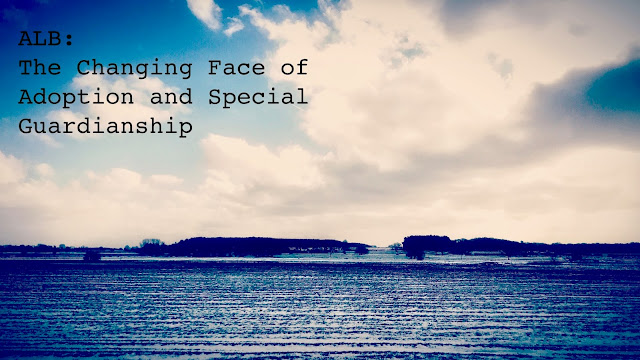Listening to John Simmonds OBE and Prof.
Beth Neil the other day the issue that really stuck with me was one of inertia
in adoption practice. As far back as 1972 support for families and the need to
explore and promote effective contact was identified as key issues for children
and families. Legislation has been amended and has the capacity to accommodate those
re occurring recommendations but practice change remains stubbornly inert. There's been some pockets of minor development
and bright lights but on the whole we've not moved that far. Actual support, and I don’t mean the Adoption
Support Fund, remains patchy and largely unpredictable. I asked John and Beth individually, 'how do we
effect change' and they both laughed and said the same thing:
'that is
the big question'
The more I pondered this I realised
that even during my first adoption application in 1999 knowledge and
understanding had already highlighted the need for the very things that we’re
all calling for every day in blogs, tweets and conversations now. We’re asking for
appropriate support and an individualised and effective approach to contact. I
can’t dwell on that thought too much as I genuinely find it upsetting, my children
and all their connected people are living with the consequences of this inertia.
The challenges my children face today were predictable and, maybe, preventable.
In fact I’m quite cross, Beth Neil’s comment that contact is probably
happening less today than when she started her research in 1997 reflects a
slide backwards. This inertia is strangling adoption.
So, rather than shake my fist at the
sky and fill my secret blog with angry stories and words I’m left wondering
where we go from here. I’m fortunate to be close to the ‘action’ and what I’ve
seen has given me a little insight to the workings of
this adoption system. There’s a lot going on and I’m often left wondering how
to affect actual change, change that impacts on the welfare of adopted children
and those connected to them. Pondering the developments of the last few years I’ve
seen that the good intentions and plans of civil servants and politicians are
necessary but in the hearts and minds of adoption services are where those
plans thrive or fail. The ASF is a good example, the amount of times families
have been given, at best, poor information and sometimes plain wrong information
is astounding. Were the ASF to fail it might not be because of intent, form or
function, I know it’s not perfect, but it might flounder because of practice on the ground.
However, I’m taking heart because I’m
an optimist and believe that we will do better. The Regional Adoption Agency
agenda is much debated and to be honest I’ve reservations as well as reasons to be
optimistic. Previously we’ve had 152 local authority and 20+ adoption services
each with their own Head of Service, the quality and effectiveness has varied
and all adopters can testify to the feeling that they’ve either won or lost the
postcode lottery. The move to RAAs is going to reduce the number of Heads of Services
to 20. So, here’s my thinking, 20 people in a room that have direct
responsibility for every adoption preparation course, assessment, panel, match,
support plan, contact plan, financial assessment and adoption social worker. Is this an opportunity to see effective development and accountability? Could it be with
20 inspired, insiring, innovative, research led, practice savvy, bothered Heads
of Service we can transform adoption. Previously getting all concerned in a
room was not practical and if 25 didn’t turn up because they couldn’t be
bothered nobody noticed. If one person is missing from a room of 20 they can be
followed up and asked difficult questions of. Could this be the moment where we begin to see services led by research and innovation not dogma and tradition?
Am I being naive? Probably but if
history is to believed the dogma of 1950’s adoption has a strangle hold on the
practice and risk aversion continues to lurk in the corners of adoptive practice. We
don’t want the 20 Heads of these new RAAs to be dusty old professionals,
careerists, political appointments or bean counters. Rather we want inspirational, innovators,
research led, history informed professionals that are able to break this
inertia, take some risks and create a new adoption narrative for our children
and the children that wait. We need to overcome this inertia.








